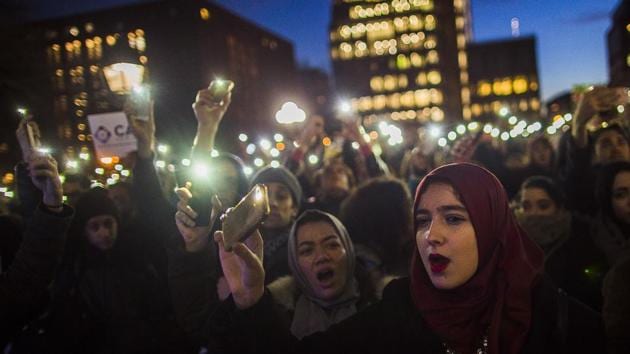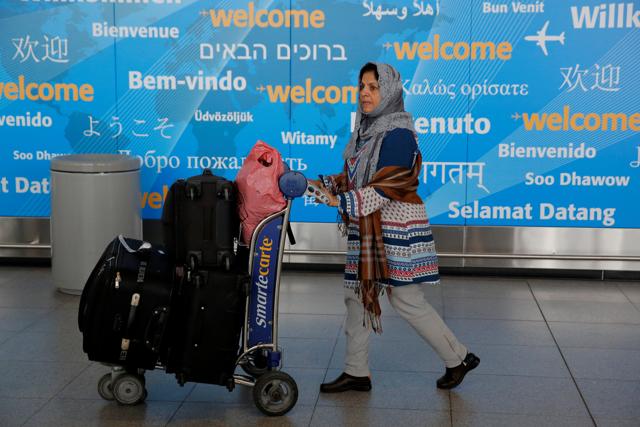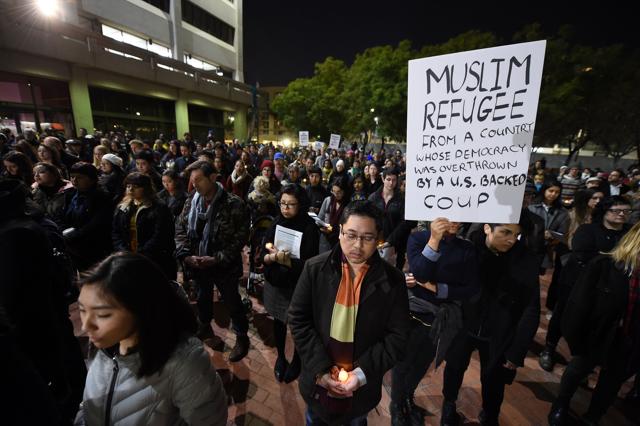Donald Trump’s ‘Muslim ban’ takes effect but faces lawsuits around the world
US President Donald Trump’s executive order barring all refugees and citizens of seven Muslim-majority countries drew criticism globally from leaders, activists, aid organisations and even private companies such as Google, whose chief Sundar Pichai described its effects as “painful”.
US President Donald Trump’s executive order barring all refugees and citizens of seven Muslim-majority countries from entering the United States took effect on Friday leading to detentions and entry-denials at airports in the country and around the world.

The order drew criticism globally from leaders, activists, aid organisations and even private companies such as Facebook and Google, whose chief Sundar Pichai described its effects as “painful”.
The constitutionality of the order has already been challenged by lawyers representing two Iraqi refugees detained at the JFK airport in New York. More lawsuits are expected over the next few days from civil rights and Muslims’ organisations.
Trump’s order, signed at a ceremony at the Pentagon to swear in James Mattis as the new defence secretary, prevents people from Iraq, Iran, Syria, Yemen, Sudan, Somalia and Libya, all Muslim nations, from entering the US for the next 90 days.
The order, which has been called a “Muslim ban”, also blocks refugees from all over the world for 120 days — indefinitely for those from Syria. And when the ban lifts, annual intake for 2017 will be 50,000, down by more than half from 2017.
“We don’t want them here,” Trump said signing the order, which introduces new vetting measures and rules for admission. “We want to ensure that we are not admitting into our country the very threats our soldiers are fighting overseas.”

The president also signed an executive action, different from an order that is enforceable by law, a “great rebuilding of the armed services” by developing “a plan for new planes, new ships, new resources and new tools for our men and women in uniform”.
But it was the “Muslim ban” that was generating more attention and opposition.
The Council on American Islamic Relations, a leading Muslim body, has said it plan a constitutional challenge to the order on behalf of more than 20 individuals.
The American Civil Liberties Union, the International Refugee Assistance Project at the Urban Justice Center, the National Immigration Law Center, Yale Law School’s Legal Services Organization and others have already filed complaints.
France and Germany voiced disquiet over Trump’s moves to limit refugees. “This can only worry us... Welcoming refugees who flee war and oppression is part of our duty,” French foreign minister Jean-Marc Ayrault said at a joint news conference in Paris with his German counterpart Sigmar Gabriel.
“The United States is a country where Christian traditions have an important meaning. Loving your neighbour is a major Christian value, and that includes helping people,” Gabriel said .
Iran said it would stop US citizens entering the country in retaliation to Trump’s order.

Malala Yousafzai, shot in the head by the Pakistani Taliban in 2012 to stop her campaigning for girls’ education and co-winner of the 2014 Nobel peace prize, impored Trump to “not to turn his back on the world’s most defenseless children and families.”
The UN refugee agency and International Organization for Migration called on the Trump administration to continue offering asylum to people fleeing war and persecution. “The needs of refugees and migrants worldwide have never been greater and the US resettlement programme is one of the most important in the world,” the Geneva-based agencies said in a joint statement.
The order has also been slammed by private companies such as Google and Facebook. “It’s painful to see the personal cost of this executive order on our colleagues,” Pichai wrote in a memo to staff.
Facebook’s Mark Zuckerberg wrote in a post, “Like many of you, I'm concerned about the impact of the recent executive orders … We need to keep this country safe, but we should do that by focusing on people who actually pose a threat.”
And Joe Crowley, chairman of the House Democrats caucus, said it was “unconscionable” that Trump would shut the door on “desperate children, families, and elderly who have been forced to flee their homes and countries affected by violence and war”.
Some on Trump’s own National Security Council had concerns about the order, Associated Press reported, but were ignored by the inner circle, possibly chief strategist Steve Bannon and the president’s son-in-law and advisor Jared Kushner.
The impact of the ban was felt swiftly in the US and around the world. Two Iraqi refugees — one of whom had worked for the US government in Iraq — were stopped and detained by customs and border patrol at the JFK airport in New York on Friday night.
And seven US-bound migrants — six from Iraq and one from Yemen — being escorted by officials of the UN agency for refugees were prevented from boarding an EgyptAir flight for New York in Cairo in the early hours of Saturday.
An attorney for the Iraqis stopped at the Kennedy Airport told The New York Times that when he asked the customs officials who they should speak to to resolve the client’s situation, he was told, “Mr President … Call Mr Trump.”
Trump started down this road with an extreme position, calling for a temporary ban on Muslims entering the country in the aftermath of the San Bernardino terrorists attack in December 2015, that reminded a lot of Americans of 9/11.
He toned it down over a period of time to “extreme vetting” for visitors and immigrants from areas of the world impacted by terrorism, mostly, it was extrapolated, Muslim-majority countries, some of whom figured on the Friday blacklist.
But it did not include Afghanistan, Pakistan and Turkey, countries hit the hardest by terrorist attacks in recent times. But the order said clearly that more countries could be added to that list as deemed necessary by relevant government agencies.
(with agency inputs)



